8 AI Implementation Challenges for Law Firms in 2025
Law firms face real barriers when adopting AI. This guide explores the top eight AI implementation challenges for law firms and offers practical solutions. Learn how tools like an AI legal answering service can streamline intake, improve efficiency, and support digital transformation in 2025.
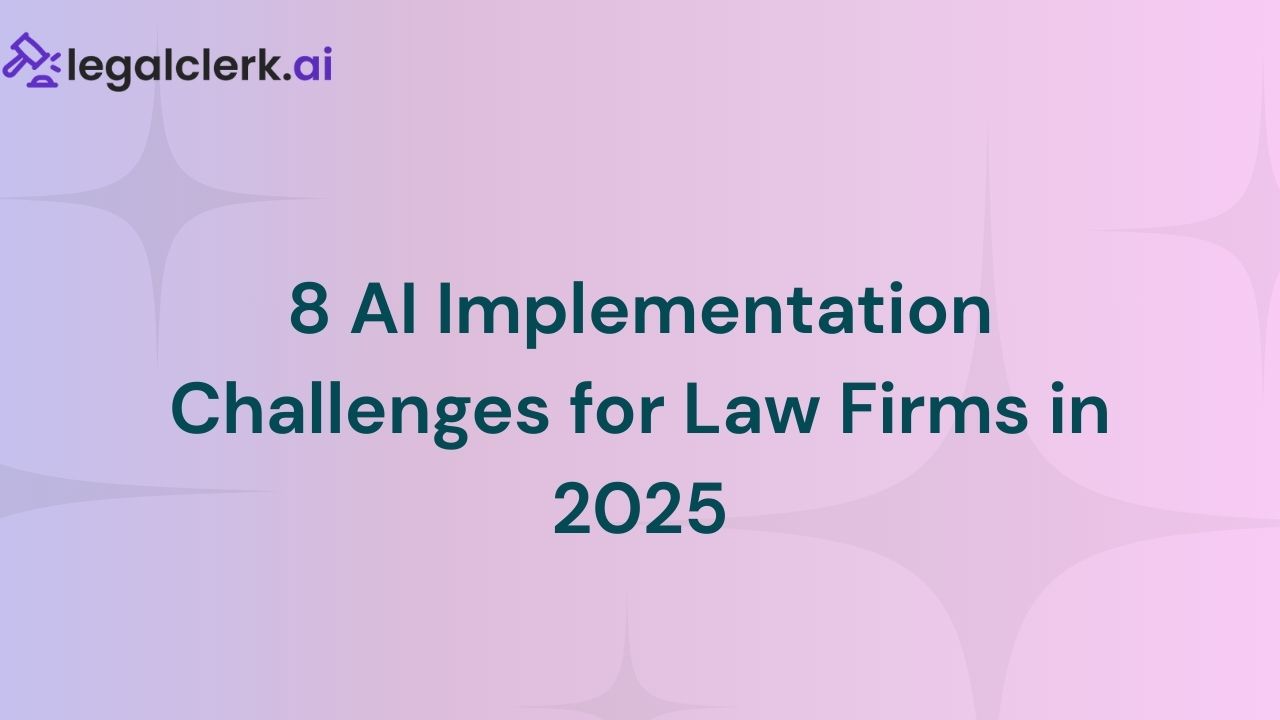
What are the biggest challenges law firms face with AI implementation? Many firms see the promise of AI but struggle with adoption. Today, 79% of lawyers already use AI in some form, yet most firms still have untapped potential. In fact, nearly 74% of billable tasks could be automated with the right tools.
AI can transform legal practices, but the path isn’t always smooth. Firms face real obstacles, ranging from data security to lawyer resistance. Here are eight common challenges in AI implementation for law firms and clear solutions to overcome them.
Challenge 1: Legal AI Adoption Barriers: Why Law Firms Resist Technology
Law firms often move slowly when it comes to adopting new tools. Many firms remain uncertain about where to begin their AI implementation journey. This prevents attorneys from recognizing the value AI brings to daily legal work.
Solution:
Demonstrate how AI legal answering services or AI document review software can save time and improve accuracy. Vendors provide straightforward training so attorneys can quickly experience the benefits for themselves. Lawyers are already comfortable with tools like research databases and eDiscovery software. Extending this into a broader law firm digital transformation with AI helps cut repetitive tasks and boost efficiency. For example, Kyocera Document Solutions Japan Inc. adopted the legal AI platform “Anaqua” to manage its large patent portfolio. It unified patent and payment management, improved visibility and control, and streamlined workflows.
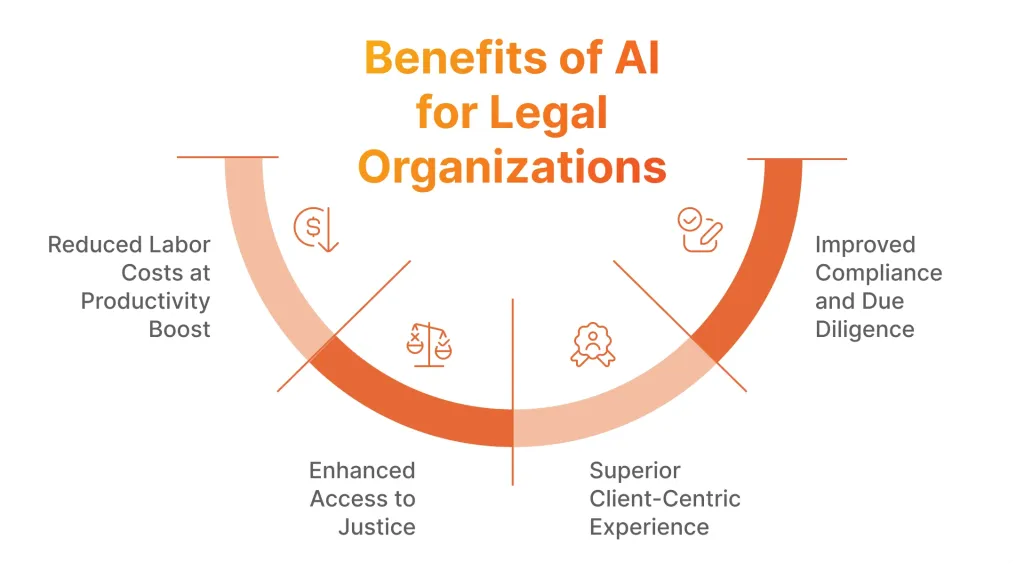
Challenge 2: Law Firm Data Security AI: Compliance and Privacy Concerns
Law firms handle highly sensitive client records. This makes data security in AI implementation a critical concern. Any breach could damage trust and trigger serious legal consequences. Although it’s best not to share confidential details with third-party tools, firms often must use client data to operate legal AI integration platforms. When considering a new technology, read carefully through the vendor’s terms of service and understand how they handle client-sensitive information.
Solution:
Choose AI tools that actually protect customer data and seek strong encryption and certifications such as SOC 2 or HIPAA. Make sure the vendor discloses how they handle and secure information. Plan regular security checks to identify issues quickly, keep your software updated, and train your team on basic cybersecurity. Staff members are often the first to identify security issues, so firms should ensure proper cybersecurity training.
Challenge 3: On-Premises vs. Cloud AI Solutions for Law Firms
Firms must decide between cloud AI legal solutions and on-site deployments. On-premises AI requires heavy infrastructure, in-house IT support, and large budgets. Most law firms do not have the resources to maintain private data centers or manage advanced hardware.
Solution:
Cloud AI solutions are often the smartest option for small and medium-sized law firms. They are economical, flexible, and secure. They meet strict compliance standards such as HIPAA and SOC 2. Platforms like LegalClerk.ai, a cloud-based AI legal answering service, make it easy to adopt AI without heavy upfront investment.
Challenge 4: AI Integration with Existing Law Firm Software
Small and mid-sized law firms hesitate to adopt new AI tools if they don’t work with their current systems. Attorneys already rely on practice management software, billing platforms, and case management tools. If an AI implementation for law firms doesn’t integrate seamlessly, it feels like extra work instead of a solution.
Solution:
Many legal AI integration platforms connect easily with existing software. Vendors are rolling out native AI features and offering smooth connections through APIs, webhooks, or cloud services. This ensures that AI tools for small law firms work alongside trusted systems, making adoption simpler and less disruptive.
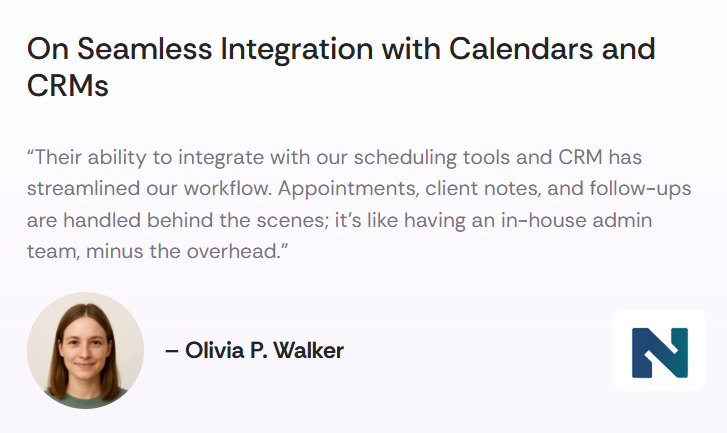
Challenge 5: Legal AI Ethical Concerns
Attorneys face strict ethical and regulatory rules, making AI implementation in law firms a sensitive issue. Generative AI tools sometimes create errors or “hallucinations,” including fabricated case law in briefs or opinions. Confidential client data could also be exposed if uploaded to third-party platforms. Client details risk being used to train future models without clear opt-outs provided by AI vendors. On top of this, bias in AI systems rooted in historical data can reinforce discriminatory practices in the legal field.
Solution:
Legal professionals remain responsible for all AI-generated output and must carefully review every result. AI can make mistakes or show bias, and attorneys bear responsibility for any unchecked errors. Firms should establish clear protocols for AI tool usage, especially when handling client data. Never feed sensitive information into random AI platforms. Stick with legal-specific AI solutions that meet HIPAA, SOC 2, and ABA standards.
Challenge 6: Fear of Replacing Human Lawyers with AI
It’s natural for lawyers to worry that AI might replace them. Stories about automation in the news often make this fear stronger, leading many in the legal field to resist new technology.
Solution:
Law firms should view AI legal technology as an advanced assistant, not a replacement for attorneys. Tools like AI legal answering services handle the routine stuff, screening calls, scheduling appointments, and basic intake. AI cannot read social cues, demonstrate genuine empathy, or adapt dynamically in courtroom situations. These uniquely human skills remain essential. AI can free attorneys from mundane tasks, allowing them to focus on work requiring human judgment and expertise.
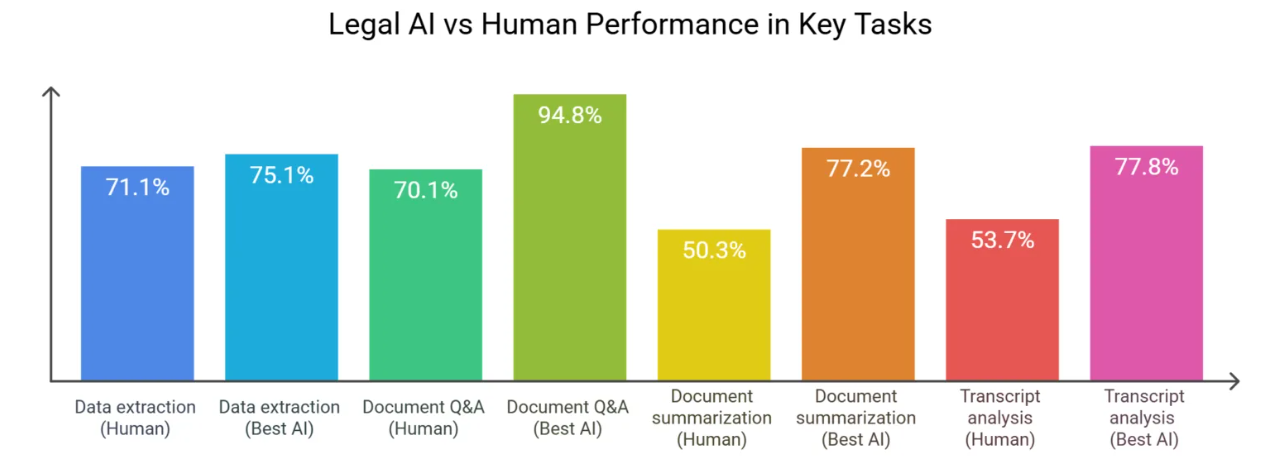
Challenge 7: Unclear ROI and Legal AI Use Cases
One major roadblock to law firm technology implementation is a lack of clarity. Attorneys often ask: Why should we use AI? What’s the return on investment? Without clear examples, it’s hard for legal professionals to see the point of law firm digital transformation.
Solution:
AI already shows strong results in areas like legal research, document review, contract analysis, legal writing, predictive analytics, and eDiscovery. Firms can see both cost savings and efficiency gains by pointing to these proven applications. Showcasing these use cases helps eliminate doubt and highlights the real ROI of AI implementation in law firms.
Challenge 8: Lack of Internal Expertise in Legal AI
Most lawyers and legal staff lack training in AI tools designed for law firms. This skills gap often discourages firms from continuing with the technology implementation. AI adoption can feel complicated without proper guidance, especially for small and medium-sized firms.
Solution:
Choose legal AI platforms that are user-friendly and easy to deploy. Many vendors now offer onboarding, training, and dedicated assistance. AI legal software is designed for fast setup and requires no technical expertise. Free demos and test periods can also help firms test solutions.
How to Start AI Implementation in Your Law Firm
Implementing AI in law firms doesn't have to be overwhelming. The right legal technology strategies keep the company competitive and safe. Follow this simple road map.
Step 1: Identify High-Impact Pain Points
Firms should analyze their workflows to identify inefficiencies in client communication, billing, and case management. Track how much time is spent on routine tasks to enable accurate ROI measurement.
Step 2: Start with High-Impact & Low-Risk Areas
Begin with an AI legal answering service to provide 24/7 availability, automate intake, and handle scheduling. Add simple document automation to streamline contracts, templates, and time entries.
Step 3: Integrate with Existing Systems
Select AI tools that integrate with existing practice management, billing, document platforms, and calendars. Ensure these tools support APIs, real-time sync, and meet security requirements.
Step 4: Track Success
Monitor performance with clear KPIs such as time saved, faster client response times, and higher satisfaction. Check adoption rates across staff and measure the impact on billable hours.
Step 5: Avoid Common Mistakes
Firms should avoid rushing into tools without clear use cases or staff training. Legal practices should prioritize proper integrations and avoid deploying multiple solutions simultaneously.
Conclusion: Overcoming AI Implementation Challenges
Law firms face many challenges in implementing AI. However, these challenges are manageable with the right strategies. A firm can use AI with confidence by focusing on clear use cases and proper training. Law firms seeking practical AI capabilities for client communication and intake should explore LegalClerk.ai.
This AI legal answering service is built specifically for law firms, delivering 24/7 availability, automated intake, and seamless scheduling. Book a free demo today.
FAQs
How to implement AI in law firms?
Start by auditing workflows. Identify one or two high-impact use cases. Test a low-risk tool like an AI legal answering service for intake. Integrate it with practice management, calendars, and CRM. Set security and governance policies. Train staff. Track key metrics. Scale adoption in phases.
What are the best AI tools for law firms 2025?
LegalClerk.ai, Lexis+ AI, Westlaw Precision AI, RelativityOne, and Luminance.
Why lawyers resist AI technology?
Lawyers cite concerns about ethics and accuracy, fears of confidentiality breaches, and difficulty measuring clear ROI.
What are AI challenges for lawyers?
Lawyers face several hurdles when adopting AI. Many resist change or worry about compliance and ethics. Data privacy and security are constant concerns, especially with sensitive client information. Some firms lack internal expertise, while others struggle to integrate AI with existing tools.
Recent Blogs
FAQs: Everything You’re Wondering About Your AI Receptionist
Absolutely. Whether you need a full-time law firm answering service or just support during off-hours, LegalClerk adjusts to your needs. You control when the AI receptionist picks up.
Yes. LegalClerk is built specifically for law firms. It knows how to handle legal intake questions, understands terminology by practice area, and never misses a required field or form detail.
Yes. Our AI legal receptionist uses advanced natural language processing and human-like voice tech to deliver a warm, responsive client experience. Most callers can’t tell it is AI — and that’s by design.
Yes. LegalClerk connects with tools like Clio, Lawmatics, Google Calendar, Calendly, and more. New leads, appointments, and intake summaries are automatically synced.
Yes. LegalClerk offers multilingual legal receptionist support, allowing you to serve a broader range of clients with accurate, translated intake flows.
Completely. LegalClerk uses HIPAA-grade encryption, secure storage, and detailed access logging. Every call and submission is protected and fully auditable.

.avif)
3.jpg)

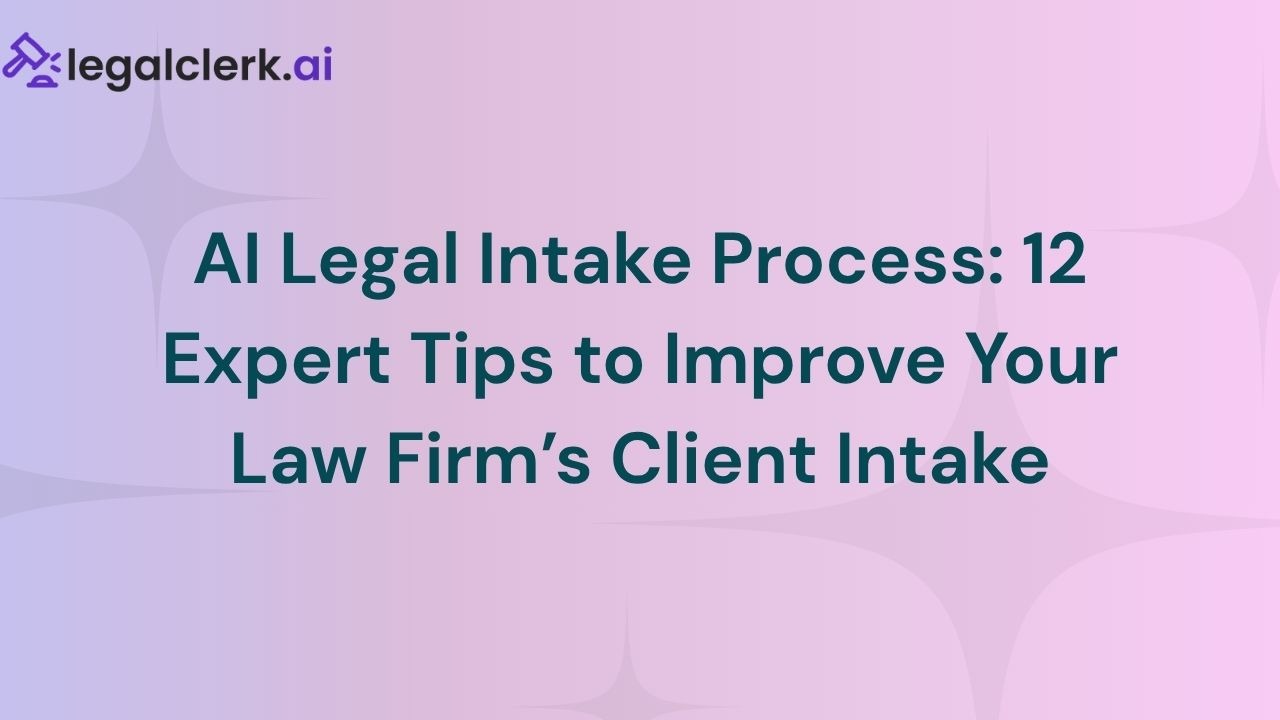
.jpg)